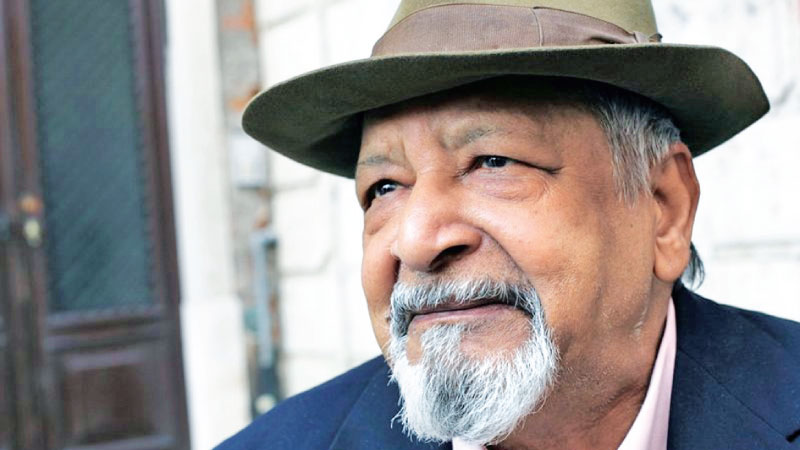The well known English novelist and the Nobel award winner Vidiadhur Surajprasad Naipaul (1932 – 2018) is no more. But I will never be able to forget the brief encounter I had with him at the BBC World Service, Bush House, Strand, in London, UK during the mid-sixties. I remember well the moment we were introduced to each other, by a friend of ours who happened to be a very close friend of Vidia, the name we used to call him.
I told him that I had by that time read two of his well-known novels, namely The Mimic Men (1967) and A House for Mr Biswas (1961).
“Oh how nice to hear all that,” was his intimate response. Then we started a discussion. The two works, when our friend remarked: “The Mimic Men is all about us, who are working in the World Service. The response on the part of Vidia was just a smile.
“Is it true?” I asked Vidia.
“It may be true for those of them who feel so.”
He said, adding an extra dimension to the narrative. For me, V S Naipaul looked a strong-willed person in both his creativity as well as in his personal attitude to problems around him. One good example was his bringing out the work titled as An Area of Darkness (1964), a brilliant account of his visit to India. His exposure to some of the events was presented in such a manner that it had caused a stir in the Indian community who lived in London at the time of publication.
Oxford scholar
For most English reader, during the sixties, Naipaul was known as a West Indian writer due to the fact that he was born into an Indian family in Trinidad. He was initially educated in Trinidad, but the chance of furthering his higher studies at Oxford. His birthplace moulds the background for most of his works. Most of the human experiences embedded are influenced by Hinduism. As Professor David Daiches who introduced Naipaul in his work British Commonwealth Literature (1971) states that his works are conspicuously Indian in orientation, and clearly influenced by an English education. After graduating from Oxford, he became a freelance writer cum broadcaster.
In the first instance, he was known as a humorist. This fact is observed in his works like The Mystic Masseur (1957), Suffrage of Elvira (1958) and Miguel Street (1859), where he uses the street as a stage for amusing and moving stories, parables and anecdotes on people and day-to-day events. He had the knack for narrating stories in the way he desired giving vent to humorous dialogues and situations. This factor paved the way for him to become a favourite writer among the contemporary writers.
In this direction, he was more an English writer than an oriental writer of the calibre of R K Narayan and Rabindranath Tagore. Some critics feel that his work In a Free State, which won the Man Booker Award in 1971, is a combination of his vision and creativity and rationalism. He was outspoken about politics and life.
Quite a lot has been written about his personal life and the career as a freelance writer during his stay in England. As he was dogged by money, worries and loneliness and alienation, he was pressed to write and lead a life of a prolific pen pusher. Nevertheless, he had a lot to write during his 85 years of life. As he met his first wife, Pat, at Oxford, she was a literary supporter. In 1996, she died. Then he met Pakistani journalist Nadire Alvi who became his wife for the rest of his life.
Cynical comments
He had been saying that: My life is short. I can’t listen to banalities. It is also said that he was not only worried about the Indian politics but also was at times passed cynical comment on the need to change it. He was once interviewed for Radio by a British writer Patrick French who later brought out this biography titled The World is What it is: the authorised biography of V S Naipaul.
Once during my visit to India in a study tour, I came to know that Naipaul studies have come to be introduced as a special literary course in a few universities. I also came to know that this was a friend as set by some of the English literature professors who had studied literature in the UK. But some literary stalwarts detested the move reminding that Naipaul is quite critical about the Indian literary and political scene.
“This is the very reason why we should try our best of study Naipaul,” commented one senior professor. I felt that Naipaul studies had paved the way to a cross-cultural communication study that was broad-based in both vision and teaching. For his creative process as stated by Naipaul himself, he had the habit of recording day-to-day events in the form of a series of notes and revelations.
This process as stated by Naipaul, led to a better introspective understanding of the existing socio-cultural patterns of the humans in the public sphere, with an emphasis on the Orient and the Occident. Having left Trinidad for he lived in London most of his time contributing to various magazines and periodicals and regular television appearances. He was often requested to comment on subjects closer to his heart on the television programme known in the sixties as Late Night Line Up presented by David Dingleby.
Naipaul had written more than 40 books since receiving the Nobel award. He was silent until his demise two weeks ago.



Add new comment